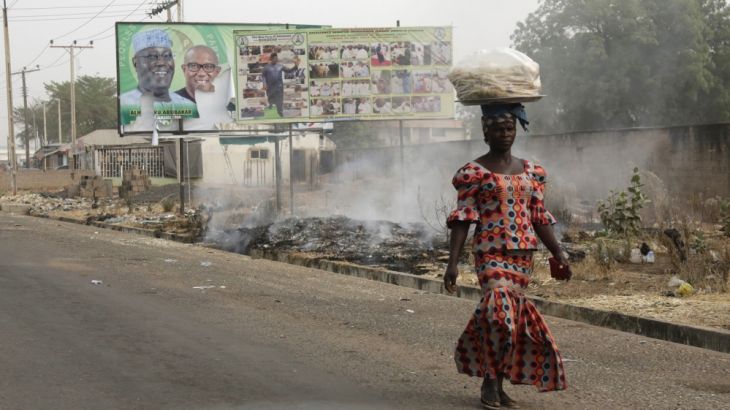
Young and unemployed in Nigeria
Why joblessness is such a huge problem in Africa’s most populous nation.
Africa’s most populous nation and largest economy has a youth unemployment problem. In Nigeria, nearly a quarter of the population is out of work and 20 percent is underemployed.
For young people aged 15 to 35, the figures are grim: 55.4 percent of them are without work. Creating jobs has been one of the key issues discussed throughout this year’s election campaign.
Keep reading
list of 4 itemsWhy is Biden ratcheting up the trade war with China?
‘We love Taiwan’: Domestic workers hope for more from new President Lai
Ship that caused deadly Baltimore Key bridge collapse towed to port
Being young in Nigeria is “very challenging”, explains Andrew Nevin, advisory partner and chief economist at PwC Nigeria.
“Graduates from university have a great deal of difficulty in getting established. People that didn’t go to university who should be getting vocational training are not getting it. They’re not getting into formal employment. Given the scale of Nigeria, it’s a challenge not just for Nigeria, but for Africa and the whole world.”
There are systemic problems behind unemployment, Nevin points out.
“Oil over the last 30 years in this country has meant people have taken their eye off other industries, there’s a lack of diversification that we have. The good news is that everyone recognises it, and they recognise it’s a crisis … People are discussing youth unemployment, the need for youth to be employed to have something gainful to do.”
Unless Africa trades with Africa and unless Africa invests in Africa, we're going to continue to be poor.
“Structural problems remain here, the government hasn’t tackled issues around the exchange rate policy or the oil subsidy … so all of these issues are holding back investment and growth in Nigeria.”
In order for Nigeria to grow faster, “The country needs more investment,” according to Nevin. “The most important thing is we need the private sector to grow in the next decade 10-15 times larger to really make a dent in unemployment and poverty in Nigeria. And that means every sector … the biggest sector that needs to grow in Nigeria is real estate. Everyone needs a place to live and we have a deficit of 17 million homes, and the great thing about real estate is that it employs a lot of people, particularly carpenters, plumbers, labourers – so it really absorbs that young population.”
“Africans are going to continue to be poor unless Africans trade with Africans and increase the value added. We’re very strong proponents of the African Continental Free Trade Agreement (AfCFTA) … it’s obvious that if we’re just exporting raw materials to Europe or Asia, that we’re going to continue to be in poverty in Africa. So I think people have recognised that, and I think the speed at which the AfCFTA agreement has come together is really astonishing. It illustrates there’s a sense of a pan-Africanism that’s coming, and the leaders of that recognise that unless Africa trades with Africa and unless Africa invests in Africa, we’re going to continue to be poor.”
Also on this episode of Counting the Cost:
Airbus A380: Production of the world’s largest passenger jet is to end as a result of falling orders. Aircraft manufacturer Airbus has announced plans to stop making the A380 in two years’ time, threatening thousands of jobs, as Natacha Butler reports from Toulouse.
|
|
“The A380 is a superb plane – it’s technologically brilliant, but it’s an expensive plane both, to build and also to fly because it uses a lot of fuel,” according to David Bailey, professor of industrial strategy at Aston University in Birmingham.
“We’ve seen a growth in mid-range planes which are much cheaper to fly, so airlines have tended to prefer those instead.”
“The A380 isn’t selling as much and it’s not profitable … the plane will be in service for many years to come on big-trunk routes like major hubs in the Middle East, but going forward they’re not looking to expand their fleets and they won’t be looking to replace them … so we’ll still see them for many years, but simply not on the scale that Airbus had imagined when they invested very very heavily in developing this enormous aeroplane,” says Bailey.
Turkey’s ghost estates: Unfinished houses, empty high rises and row upon row of homes fit for royalty have all become symbols of Turkey‘s struggling economy. Construction has been the turbine behind the country’s growth, but high inflation and a devalued currency are threatening to make the industry go from boom to bust, as Stefanie Dekker reports from Mudurnu.
Thailand fishing: Thailand is one of the world’s largest exporters of fish. But its industry has faced accusations of human trafficking and abuse. Two very different movies at Berlin’s film festival are highlighting the problem in an attempt to make us think more about the food we eat, as Nadim Baba reports from Berlin.
Venezuela oil: The United States‘s decision to sanction Venezuela‘s oil assets two weeks ago was a move designed to keep oil revenues out of President Nicolas Maduro‘s hands. But he’s been fighting back by stepping up efforts to keep state-run oil company PDVSA and its subsidiaries out of his rivals hands, as Lucia Newman reports from Caracas.